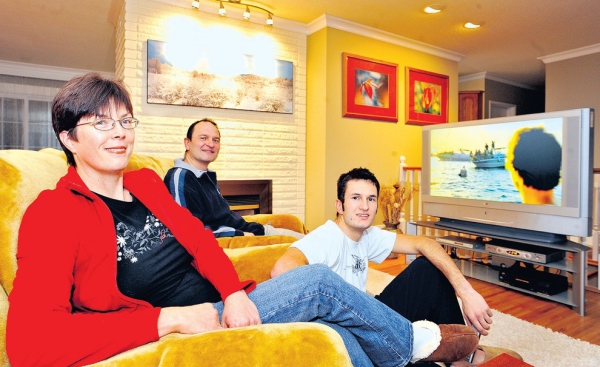Survey puts local market more out of reach than New York, London, L.A.
Susan Lazaruk
Province

Blanka Jecminkova, her husband Jiri Jecminek and son George Jecminek are pleased they were able to buy a townhouse 15 years ago and then move up to a larger detached home in Port Coquitlam. Photograph by: Les Bazso, PNG, The Province
Don Davies wasn’t surprised to learn Vancouver’s real estate was “severely unaffordable,” topping for the first time a housing-afford-ability survey of 272 cities in several countries.
“I don’t think I will ever own a home in Vancouver or be able to move back and raise a family where I grew up,” said Davies, 36, a construction worker whose earlier career as a minor-league hockey player took him to the U.S., where he settled outside Chicago.
He lives in a three-bedroom home with two-car garage worth $400,000 and said he couldn’t afford a similar home on his current pay of $15 to $20 an hour.
It now takes 9.3 years of income to buy a Vancouver home, compared with three years’ income in previous generations, according to the sixth annual Demographia housing survey, released Monday by the Frontier Centre for Public Policy in Winnipeg.
That’s up from 8.4 years, as measured two years ago and puts Vancouver at the top of the list of “severely unaffordable” housing markets in the U.S., the U.K., Ireland, New Zealand and Australia, including cities such as New York, London and Los Angeles.
In 2008 when U.S. values were skyrocketing, Vancouver was in 15th place.
The survey calculated the cities’ “median multiple” — the median residential house sale value ($540,900 in Metro Vancouver) divided by the median annual gross household income ($58,200) — and pegged Vancouver at 9.3.
Other B.C. cities in the “severely unaffordable category,” which is anything above 5.1: Victoria (7.9), Abbotsford (6.6) and Kelowna (5.9).
Outside B.C., the next highest-ranked Canadian city is Toronto, at 5.2, which falls into the “severely unaffordable” category for the first time, followed by Montreal, at 4.9.
The median for all 28 cities ranked in Canada was 3.7, up from 3.5 last year.
Kurt Leibel said he worked for seven years in tax-free Bermuda, where he was paid in U.S. dollars, specifically to save up for a Vancouver home.
“I’m happy to say I was able to purchase a nice home in Yaletown this summer,” with 50 per cent down, Leibel said.
But real-estate watchers say that, despite Vancouver’s placing in the survey, there are still entry-level properties available.
“It just reinforces what you already know, that it’s not cheap to live in Vancouver, but there are a lot more opportunities to buy in than there used to be,” said Tsur Somerville of the University of B.C.’s Sauder School of Business.
Blanka Jecminkova agreed, saying she and her husband bought a small townhouse 15 years ago after immigrating from the Czech Republic and were able to sell up to a 2,300-square-foot detached home in Port Coquitlam.
Jecminkova said she sees new one-bedrooms selling in Port Coquitlam for an affordable $160,000.
“But everybody wants to own a house on Vancouver’s west side, not just a condo,” she said.
But John Esterer disagreed, saying that, in buying a condo, any appreciated value is eaten up by maintenance fees and it’s difficult to get ahead.
Esterer bought his North Vancouver house in his 20s for $265,000.
“I don’t think anyone in their 20s could [buy the equivalent] now with their regular income and the current housing prices,” he said.
© Copyright (c) The Province
